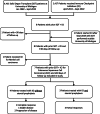A Pilot Study of Checkpoint Inhibitors in Solid Organ Transplant Recipients with Metastatic Cutaneous Squamous Cell Carcinoma
- PMID: 32969143
- PMCID: PMC7873324
- DOI: 10.1002/onco.13539
A Pilot Study of Checkpoint Inhibitors in Solid Organ Transplant Recipients with Metastatic Cutaneous Squamous Cell Carcinoma
Abstract
Background: Immune checkpoint inhibitors (ICIs) are increasingly used in various solid organ malignancies. However, there are limited data regarding their safety and efficacy in solid organ transplant (SOT) recipients. The aim of this study was to review our experience with ICIs in SOT recipients with advanced head and neck cutaneous squamous cell carcinoma (cSCC).
Methods: A retrospective review of ICIs used in SOT recipients from April 2011 to September 2019 was undertaken. Patient clinical and demographic features, ICI regimen, immunosuppression, treatment efficacy, and adverse events were reviewed.
Results: The seven SOT recipients (four kidney, two liver, one lung) were diagnosed with metastatic head and neck cSCC. All had undergone prior locoregional surgery and adjuvant radiation therapy. At a median of 10.8 years (range, 6.6-18.1) post-transplant, six were treated with cemiplimab and one with pembrolizumab after minimizing calcineurin inhibitors (CNIs) or conversion of CNI to mammalian target of rapamycin (mTOR) inhibitors. During a median follow-up of 7.1 months, overall tumor response rate was 57.1% with one complete responder and three partial responders. Four patients died at a median of 135 days after starting ICI with two dying from tumor progression and two dying from other causes. Regarding adverse events, one lung transplant recipient developed severe pneumonitis that resolved with high-dose steroids, and one renal transplant patient developed progressive renal injury and died of unrelated causes. The three patients who received prophylactic prednisone all responded to cemiplimab with preserved allograft function and no adverse events.
Conclusion: Our data suggest that minimization of CNI and conversion of CNI to mTOR inhibitors along with judicious use of prophylactic steroids may allow for the safe use of ICIs in SOT recipients with advanced cSCC. Short-term efficacy appears promising, but prospective studies with further follow-up and a standardized protocol for prophylactic steroids are needed.
Implications for practice: Solid organ transplant (SOT) recipients are at increased risk of developing malignancy because of long-term post-transplant immunosuppression. Although immune checkpoint inhibitors (ICIs) are increasingly shown to be successful in treating multiple types of cancer, SOT recipients have been excluded from clinical trials because of concerns regarding potential allograft rejection. This pilot study provides evidence that ICIs along with prophylactic steroids may be a safe and efficacious treatment option for selected SOT recipients with advanced cutaneous squamous cell carcinoma. However, further prospective studies using ICIs in this high-risk patient population are needed.
Keywords: Checkpoint inhibitor; Squamous cell carcinoma; Transplant recipient.
© AlphaMed Press 2020.
Conflict of interest statement
Figures
References
-
- O'Reilly Zwald F, Brown M. Skin cancer in solid organ transplant recipients: Advances in therapy and management: Part I. Epidemiology of skin cancer in solid organ transplant recipients. J Am Acad Dermatol 2011;65:253–261. - PubMed
-
- Madan V, Lear JT, Szeimies RM. Non‐melanoma skin cancer. Lancet 2010;375:673–85. - PubMed
MeSH terms
LinkOut - more resources
Full Text Sources
Medical
Miscellaneous


